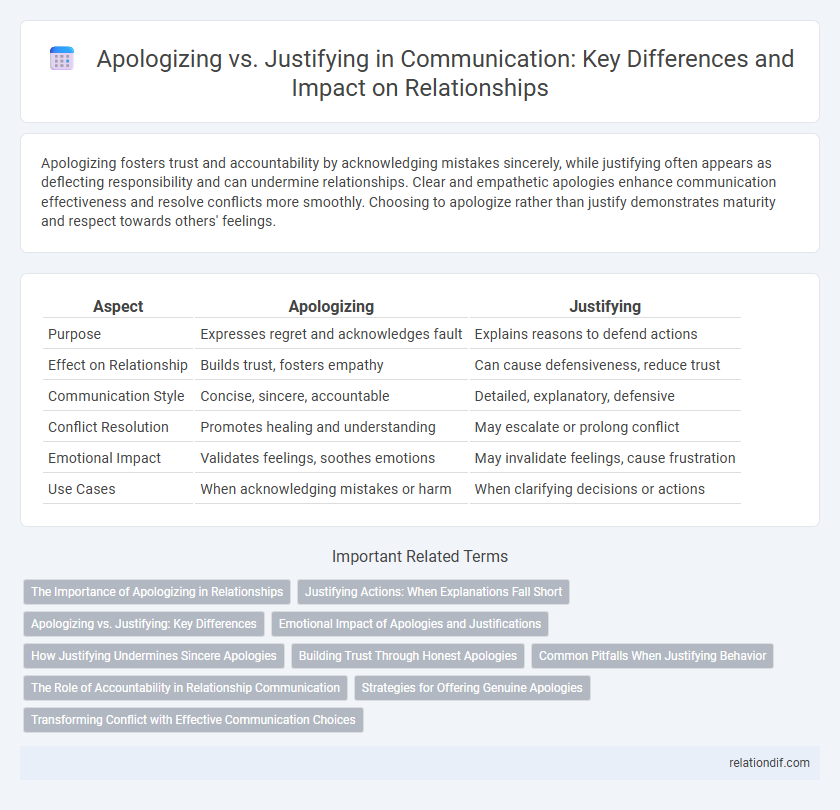Apologizing fosters trust and accountability by acknowledging mistakes sincerely, while justifying often appears as deflecting responsibility and can undermine relationships. Clear and empathetic apologies enhance communication effectiveness and resolve conflicts more smoothly. Choosing to apologize rather than justify demonstrates maturity and respect towards others' feelings.
Table of Comparison
| Aspect | Apologizing | Justifying |
|---|---|---|
| Purpose | Expresses regret and acknowledges fault | Explains reasons to defend actions |
| Effect on Relationship | Builds trust, fosters empathy | Can cause defensiveness, reduce trust |
| Communication Style | Concise, sincere, accountable | Detailed, explanatory, defensive |
| Conflict Resolution | Promotes healing and understanding | May escalate or prolong conflict |
| Emotional Impact | Validates feelings, soothes emotions | May invalidate feelings, cause frustration |
| Use Cases | When acknowledging mistakes or harm | When clarifying decisions or actions |
The Importance of Apologizing in Relationships
Apologizing in relationships fosters trust and emotional healing by acknowledging mistakes and validating feelings, which strengthens connection and promotes mutual respect. Unlike justifying, which may create defensiveness and hinder genuine reconciliation, sincere apologies demonstrate accountability and empathy. Effective communication hinges on expressing regret authentically, allowing partners to move past conflicts and rebuild intimacy.
Justifying Actions: When Explanations Fall Short
Justifying actions often involves providing reasons that may not fully address the emotional impact or concerns of others, leading to misunderstandings or diminished trust. Explanations that fall short can create defensiveness rather than fostering genuine resolution or empathy. Effective communication requires balancing transparency with accountability to rebuild rapport and mutual understanding.
Apologizing vs. Justifying: Key Differences
Apologizing involves acknowledging fault and expressing regret, which fosters trust and emotional repair in communication. Justifying shifts focus to explaining reasons or excuses, often perceived as deflecting responsibility and can hinder resolution. Effective communication relies on sincere apologies to build empathy, while justifications may create defensiveness and impede mutual understanding.
Emotional Impact of Apologies and Justifications
Apologizing directly addresses the emotional hurt caused, fostering trust and promoting healing by validating the other person's feelings. Justifications often focus on explaining or defending actions, which can unintentionally minimize the emotional impact and lead to misunderstandings or resentment. Prioritizing sincere apologies over justifications enhances emotional connection and strengthens interpersonal relationships.
How Justifying Undermines Sincere Apologies
Justifying behavior during an apology shifts focus away from acknowledging responsibility and diminishes the sincerity of the expression. Effective apologies require unambiguous acceptance of fault to rebuild trust and foster genuine resolution. Research in communication theory identifies that apologies coupled with justifications often lead to increased defensiveness rather than reconciliation.
Building Trust Through Honest Apologies
Honest apologies strengthen communication by demonstrating accountability and empathy, which are essential for building trust. Unlike justifying mistakes that can create defensiveness, a sincere apology acknowledges the impact of one's actions and fosters genuine connection. Consistently offering transparent apologies encourages openness and reliability in relationships, enhancing mutual respect and understanding.
Common Pitfalls When Justifying Behavior
Justifying behavior often leads to misunderstandings because it can come across as defensive, minimizing the impact of one's actions, and shifting blame. Common pitfalls include failing to acknowledge the feelings of others, over-explaining, and appearing insincere, which can erode trust and damage relationships. Effective communication relies on genuine apologies that validate emotions rather than rationalizing mistakes.
The Role of Accountability in Relationship Communication
Apologizing demonstrates accountability by acknowledging mistakes and fostering trust, which strengthens relationship communication. Justifying often shifts blame and can create defensiveness, hindering open dialogue and emotional connection. Emphasizing accountability through sincere apologies promotes mutual respect and conflict resolution.
Strategies for Offering Genuine Apologies
Effective communication hinges on offering genuine apologies that acknowledge responsibility clearly without shifting blame. Strategies involve expressing empathy by recognizing the impact of one's actions and committing to corrective measures while avoiding justifications that may undermine sincerity. This approach fosters trust and repair by prioritizing the feelings of the offended party and demonstrating accountability.
Transforming Conflict with Effective Communication Choices
Apologizing fosters trust and de-escalates conflict by showing accountability and empathy, whereas justifying often triggers defensiveness and prolongs disputes. Choosing to apologize effectively transforms conflict into an opportunity for resolution and understanding. Effective communication prioritizes acknowledgment of feelings over rationalizations, enabling collaboration and healing.
apologizing vs justifying Infographic

 relationdif.com
relationdif.com